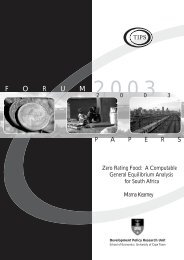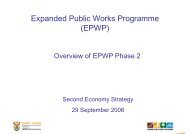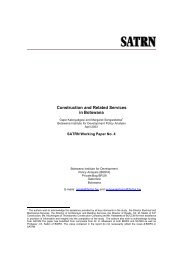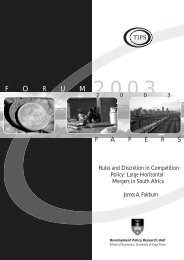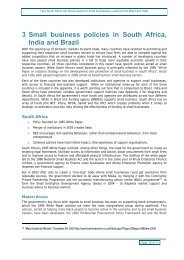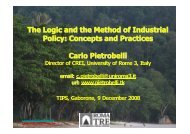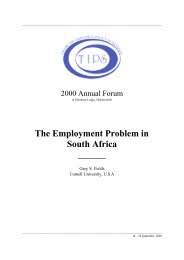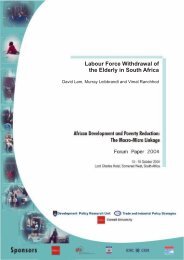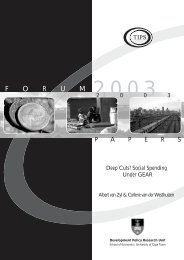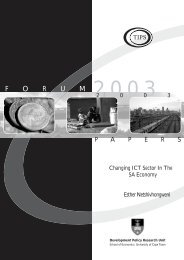Monitor Vol 39 08_Final_Nov08.pdf - tips
Monitor Vol 39 08_Final_Nov08.pdf - tips
Monitor Vol 39 08_Final_Nov08.pdf - tips
Create successful ePaper yourself
Turn your PDF publications into a flip-book with our unique Google optimized e-Paper software.
environmental<br />
policy<br />
45<br />
Biofuels,<br />
agriculture<br />
and poverty reduction 1<br />
Trade & Industry <strong>Monitor</strong><br />
By Leo Peskett 2 , Rachel Slater 3 , Chris Stevens 4<br />
and Annie Dufey 5<br />
1. Introduction<br />
Sweeping claims have been made about the role of biofuels in development and poverty reduction<br />
(see Peskett et al, 2007 for a review). For example, it has been argued that<br />
•<br />
•<br />
•<br />
energy crops are beginning a green revolution in Brazil;<br />
a bioproduct-based agro-revolution can offer a new development paradigm;<br />
biofuels can provide a solution to the twin problems of poverty and climate change; and<br />
• countries in the tropics have comparative advantage in biofuels production which can play a<br />
role in job creation and food security.<br />
1<br />
This paper was first published in the Overseas Development Institute’s (ODI’s) Natural Resource Perspectives Series (June<br />
2007), which presents accessible information on current development issues (www.odi.org.uk). ODI is the UK’s leading independent<br />
think tank on international development and humanitarian issues. The research on which this paper is based was<br />
funded by the Renewable Natural Resources and Agriculture Team of the UK Department for International Development<br />
(DFID). The arguments made in this paper are those of the authors alone and are not necessarily those of DFID.<br />
2<br />
Leo Peskett is a Research Officer at the ODI, working with the Rural Policy and Governance Group, focusing on climate<br />
change issues. Email: l.peskett@odi.org.uk<br />
3<br />
Rachel Slater is a Research Fellow at the ODI, working with the Rural Policy and Governance Group. Email: r.slater@odi.<br />
org.uk<br />
4<br />
Chris Stevens is the Director of Programmes of the International Economic Development Group at the ODI. Email:<br />
c.stevens@odi.org.u<br />
5<br />
Annie Dufey is a Researcher in the Sustainable Markets Group at the International Institute for Environment and Development.<br />
Email annie.dufey@iied.org<br />
The development of biofuels has generated vigorous<br />
debate on economic and environmental grounds.<br />
Our attention here is on its potential impacts on<br />
poverty reduction. The potential is large, whether<br />
through employment, wider growth multipliers and<br />
energy price effects. But it is also fragile: it will be<br />
reduced where feedstock production tends to be<br />
large scale, or causes pressure on land access,<br />
and its success can be undermined by many of the<br />
same policy, regulatory or investment shortcomings<br />
as impede agriculture. Whilst some of the factors<br />
facilitating, and impacts of, biofuels can be tracked<br />
at global level, its distributional impacts are complex,<br />
and point to the need for country-by-country analysis<br />
of potential poverty impacts.



